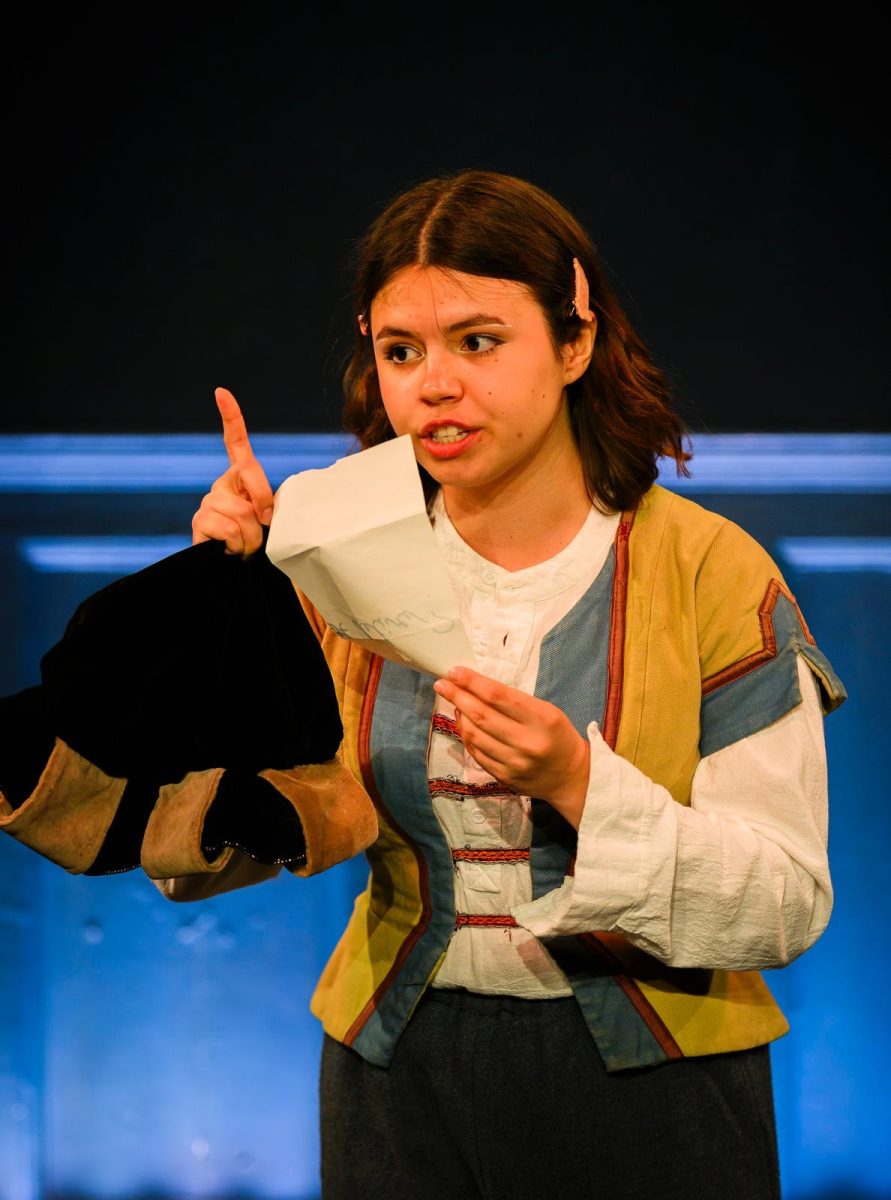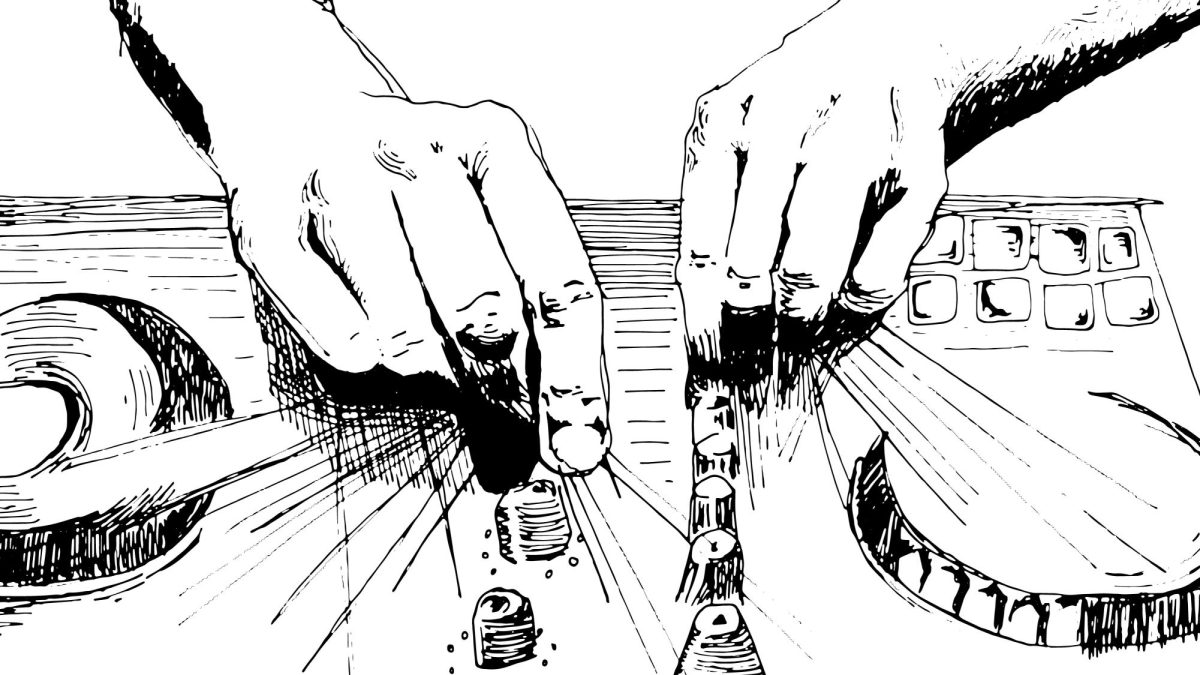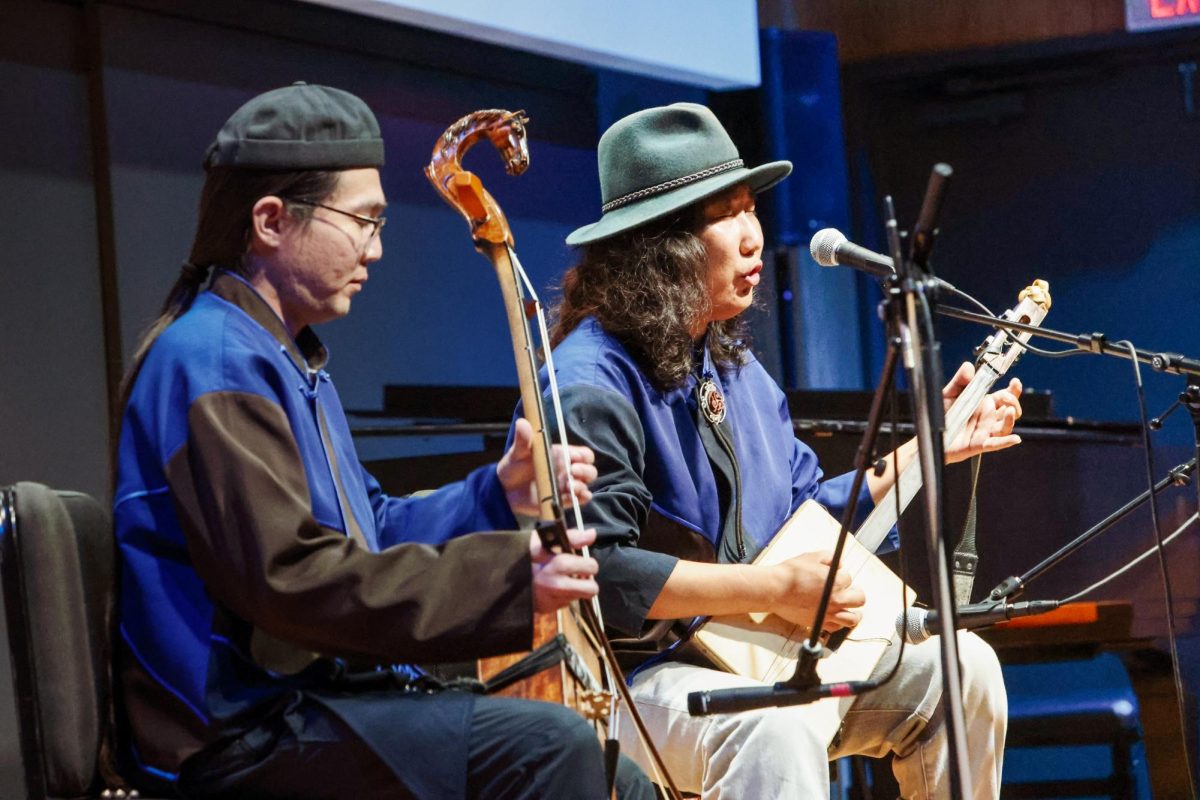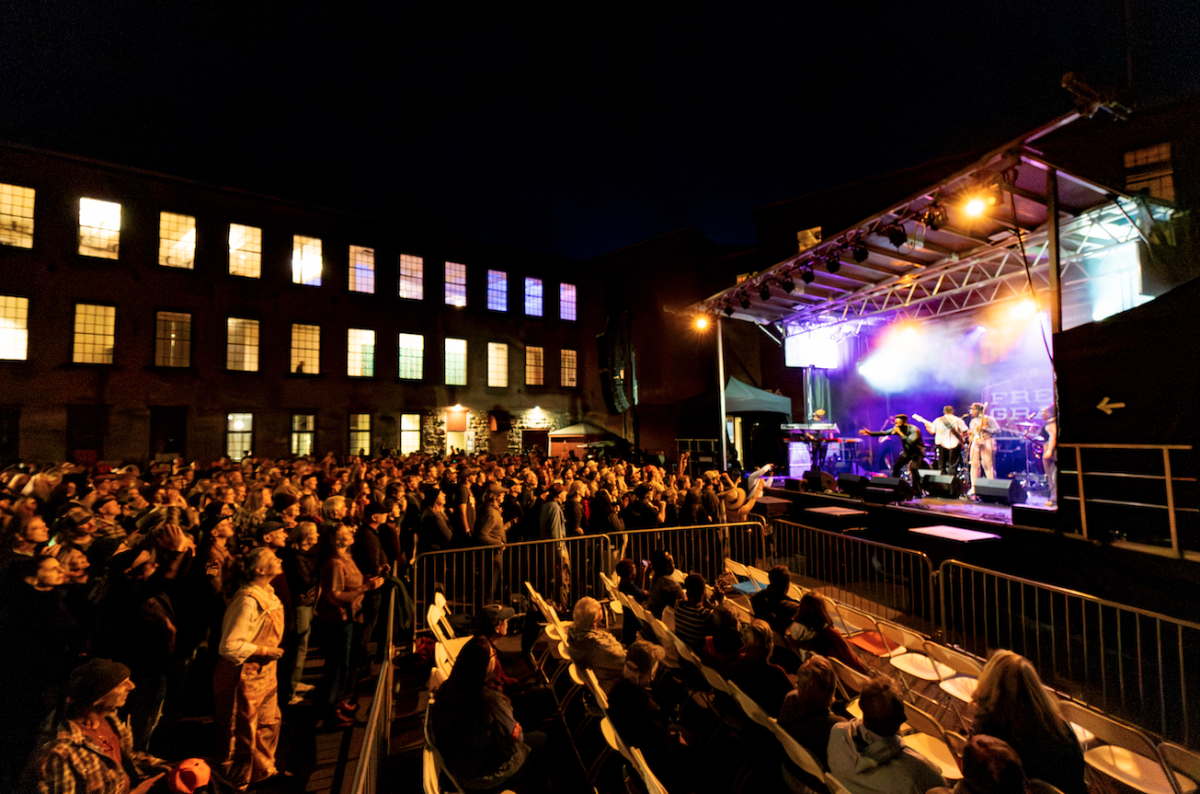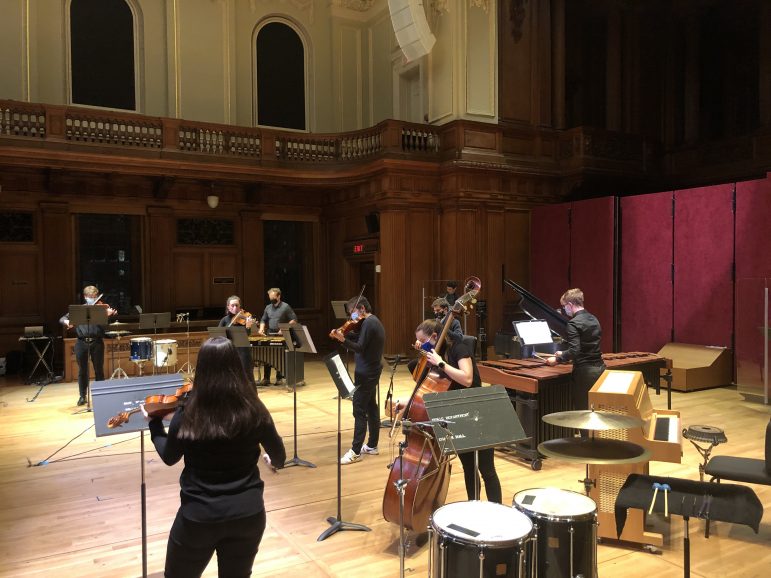
(Photo courtesy of Jeffrey Miller.)
When asked what I/O stands for, violist and pianist Rebecca Christainsen ’21 said she had no idea. “The myth is that no one knows what it stands for,” she said. “I have no idea what it stands for. I once heard Matt Gold say it’s more symbolic, like the I is a mallet, and the O is a cymbal or a drum or some percussion instrument.”
I/O Artistic Director Matthew Gold, however, revealed its original meaning. “It is not a secret, but the name has in some ways outlived its origins,” he said. “It stands for Input/Output, and was a kind of shorthand for the process of taking all of our inputs — notes, sounds, ideas, experiences — and making them into something we could send back out and share with the audience.”
Additionally, the input/output idea relates to I/O’s goal of being a collaboration and an opportunity for students to have their own work performed. “One of the core missions of I/O has always been to provide opportunities for current students and alumni to take part directly in all aspects of musical creation and performance,” said Gold, who is also the Artist in Residence in Percussion and Contemporary Music Performance. “The Input/Output idea is related to this as the festival is the result of all of the collaborative work that goes into it.”
This year, Gold and his students put in extra work to make I/O a COVID-19-friendly musical experience, while placing an emphasis on new and diverse composers.
On Friday at 7:30 p.m., the I/O ensemble performed four works of classical contemporary music in a program titled Away for a small invited audience in Chapin Hall, while almost 40 viewers watched on a YouTube live-stream. Though many music ensembles have been cancelled this year due to COVID restrictions, which prohibit masked musicians from being within six feet of each other and unmasked musicians from being within 15 feet, the I/O ensemble has been able to rehearse and perform due to the abundance of spatial possibilities that experimental music poses.
“The issue of distance is really important and the program has tried to address it directly by choosing works in which the players are in some ways designed to not be next to one another,” Gold said.
“One of the works in the program, by David Lang, places the cellist at the center, with four percussionists who can be arranged spatially throughout the hall, creating distance from the soloist,” Gold said. “So rather than the sound coming from the stage, the sound surrounds you and you end up inside of it as it comes from all directions.”
In addition to David Lang’s Little Eye featuring the cello, the pieces performed on Friday included Linda Catlin Smith’s small ensemble piece Stare at the River, Mario Diaz de Leon’s Labrys for bassoon and electronics and Betsey Biggs’ minimalistic ensemble piece Away, for which Friday’s program was named.
The I/O New Music Festival, which presents contemporary music written by new composers, is typically held over Winter Study, with four concerts at the ’62 Center for Theatre and Dance, two at the Clark and other various ones in outdoor locations. However, with the cancellation of Winter Study this year, I/O performances have been happening throughout the fall semester, and will continue into the spring.
“We’ll be thinking of events we can do throughout the year, not just in a single, concentrated period of time,” Gold said. “We are looking at a range of different ways in which we can connect with one another and with audiences.”
Gold created the I/O New Music Festival 10 years ago alongside Devid Kechley, Professor of Music Emeritus, and Steven Bodner, Music Director of the Symphonic Winds and Opus Zero Band. Sadly, Bodner died a year after I/O’s formation, but Gold said that his spirit lives on through I/O’s music. “We always remember Steven in the festival, the programming and really in all of the things we do,” he said. “We always try to honor his memory with a commitment to adventurous music.”
COVID-19 restrictions as opportunities to create new music
Even with all of the challenges that making music during a pandemic presents, Gold said he sees these restrictions as opportunities to get creative. “As an ensemble that focuses on new music, we try to approach music creatively, without the kind of preconceived ideas that you might have in other types of ensembles,” he said. “I feel like it gives us the freedom to really explore these issues. So rather than imposing limits on what we could do, the programming this year is trying to respond directly, to explore the situation and to find new ways of coming together and new modes of musical expression.”
The I/O Ensemble Teaching Assistant Thomas McGee ’22 took the opportunity to conduct for the first time during Friday’s performance, conducting Little Eye. “It was an interesting experience because we had a spatialized ensemble so there were actually percussionists behind me to my left and right, and so you probably couldn’t see them in the live-stream video … but they were actually 45 degrees behind me on both sides,” McGee said. “They were playing the glockenspiel and crotales. I think being in the concert space was an interesting experience because you had these sonic sources coming from basically all over the concert hall.”
For vocalist and violinist Sara Stebbins ’24, I/O has been experimental in more ways than one. After deciding not to bring her violin to campus or sign up for any ensembles, Stebbins realized that she missed having a music community and playing contemporary classical music specifically, so she decided to reach out to Gold to ask if she could get involved in I/O. But due to COVID restrictions, her initial vocal role shifted to something else entirely.
“I was theoretically supposed to be singing, but then we realized you aren’t allowed to sing in Chapin, and so on the day of our performance two Fridays ago, Matthew Gold handed me a melodica and was like, ‘here, play this,’” Stebbins said. “So imagine my shock on being handed that!”
Stebbins’ new instrumental endeavors did not end with the melodica. “On another one of the pieces, I was asked to fill in for someone who couldn’t make it to practices anymore, and play percussion on that — that’s the David Lang piece,” she said. “So I’m playing crotales on that, which is basically a super cool metallophone type thing.”
After singing in I/O for the past couple of years, vocalist and pianist Rebecca Kuo ’22 also stepped out of her usual singing role this year to play the piano, which she could do while wearing a mask. “I didn’t sing this year because there are a lot of restrictions on singers in general,” she said, compared to instrumentalists. “If you noticed at the concert last night, anyone who was playing an instrument unmasked was behind a big shield and was really far away from everyone else, so there was no chance of contamination.”
New and diverse voices
Gold emphasized that I/O focuses on new music written by a diverse range of composers, which contrasts with classical music that was mostly written by wealthy, white men. “The history of western classical music has been exclusionary, but this does not fully describe what’s going on in music right now,” he said. “Composers, especially young composers, come from a truly wide range of backgrounds, representing diverse cultural, racial, ethnic and gender identities. I/O is committed to inclusive programming that centers new and diverse voices, providing students with an opportunity to engage directly with the range of music that is being created and performed in today’s music world.”
Christainsen said that she appreciates the opportunity to play music by new and diverse composers. “As a classical violist or pianist, you end up playing a lot of music composed by old, dead, white people, mostly men,” she said, “so it’s kind of nice to play and give recognition to music that’s been recently composed by a more diverse set of composers.”
The importance of experimental music
Classical contemporary music may not be the most popular genre of music today, but students shared hopes that it can become more accessible to both performers and audiences. “I feel like experimental music has the reputation of being something that’s not accessible, or only for people that are super into it, but I just think that there are ways that experimental music can be a welcoming community and people can kind of come and witness and experience it,” Stebbins said. “And maybe it’s not what people are used to but I personally am really committed to making new music something that is accessible to everyone.”
Christainsen argued that experimental music is actually more accessible, at least for musicians. “The music itself is oftentimes more accessible, because it doesn’t require large ensembles with lots of expensive instruments,” she said. “Pieces like we’re playing the Biggs [on Friday], you [can] play with whichever instrumentalists you have. It’s not written for a specific ensemble.”
Bassoonist and saxophonist Matt Wisotsky ’23 said that experimental music can appeal to anyone, musically trained or not. “I think the conception of experimental classical music is not always very positive, but the stuff we’re doing doesn’t appeal to just a very high-brow, classically trained musician,” he said. “Anyone can enjoy it.”
A space to make music
In a time when most opportunities to make music have been cancelled, Kuo said she is especially grateful for I/O. “I personally have been very grateful just to get the opportunity to make music even if it’s in a more confined sense,” she said. “…We can still be in a room together and play together, which is really, really special in a time where any kind of physical collaboration in the arts is very difficult. So I’ve been extremely grateful to Matt Gold for his work in keeping the spirit of I/O alive even in this really strange year.”
McGee said he came into the fall semester with low expectations for the possibility of practicing with other musicians. “Coming to Williams in the fall, I thought we wouldn’t be able to have any woodwind instruments or brass [in performances], so it’s been exciting to see that it’s actually possible to have ensemble performances.”
Gold said that providing this opportunity for students has been rewarding and affirming for him. “Being able to reconnect our returning musicians, who have been away for so long, and to connect with new musicians, despite all of this, gives me a new sense [that] doing this is meaningful,” he said.
[adrotate banner=”3″]




